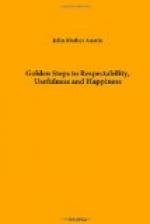In preparations for future usefulness and success, the young should establish certain fixed principles of moral conduct, by which they will be steadfastly governed in all their intercourse with the world. Without some well-defined landmarks, by which they can be guided in emergencies, when everything depends on the course of conduct to be pursued, they will be in imminent peril. Temptations are strewed along the pathway of the young, and assail them at every turn. If they could clearly contemplate the effects of giving way to temptation—were all the unhappy consequences to stand out visibly before them—they would never be induced to turn aside into sin. Could the young man as he is tempted to quaff the fashionable glass of intoxicating beverage, see plainly the ignominious life, the poverty and wretchedness, and the horrid death by delirium tremens, to which it so often leads, he would set it down untasted, and turn away in alarm. But it is the nature of temptation to blind and deceive the unwary, and lead them into sin, by false representations of the happiness to be derived from it. Hence the young need to establish, in their calm, cool moments, when under the influence of mature judgment and enlightened discretion, certain fixed rules of conduct, by which they will be governed, and on which they will depend in every hour of temptation.
One of the first and most important rules of life which should be established by the youthful, is the constant cultivation of purity of heart. This is the great safeguard of the young. It is their brightest jewel—their most attractive ornament—the crowning glory of their character and being. It adds a captivating lustre to all charms of whatever description; and without it all other excellencies are lost in perpetual darkness. It should be a fixed rule, never to violate the dictates of purity either in action, language, or thought. Many imagine it is a matter of small moment what their thoughts may be, so long as in action they do not transgress the requirements of virtue. This, however, is a serious error. The outward action is but the expression of the inward thought. Wicked deeds would never have birth, were they not first prompted by wicked desires. Hence if the young would have their words and deeds characterized by purity, they must see that their hearts and thoughts are constantly pure.
“Pure thoughts are angel
visitants! Be such
The frequent inmates
of thy guileless breast.
They hallow all things
by their sacred touch,
And ope the portals
of the land of rest.”
The heart is the source of all actions. A dark, muddy fountain cannot send forth clear waters. Neither does a pure fountain send forth muddy waters. A foul heart, the receptacle of unclean thoughts and impure passions, is a corrupt well-spring of action, which leads to every vicious practice. Let the hearts of the youthful be pure as crystal, let their thoughts be sanctified by virtue and holiness; and their lives shall be as white and spotless as the driven snow—winning the admiration of all who know them. With purity as a shield, they are doubly guarded against sin. However enticing temptation may be—however artfully or strongly it may assail them—they are prepared to rise above it, in any and every emergency.




